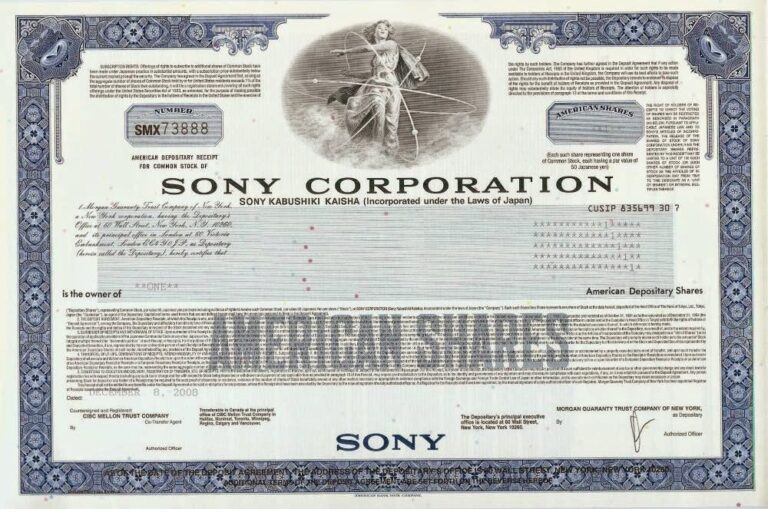What are Depositary Receipts and for what purpose they are issued.When trading stocks and bonds on the stock exchange, you need to be able to choose the most promising securities. Each exchange offers specific opportunities in this regard. However, sometimes the ability to purchase foreign stocks and bonds is limited. This may be due to the fact that they are not listed on a specific exchange or work with them has legal restrictions. Shares are not held by buyers. If, for example, a trader has made investments in securities, then they are not handed over to him. In fact, in this area, the storage rules are similar to those used in the banking sector. An account has been provided for the buyer, on which the shares and bonds to which he has the right of ownership are kept.
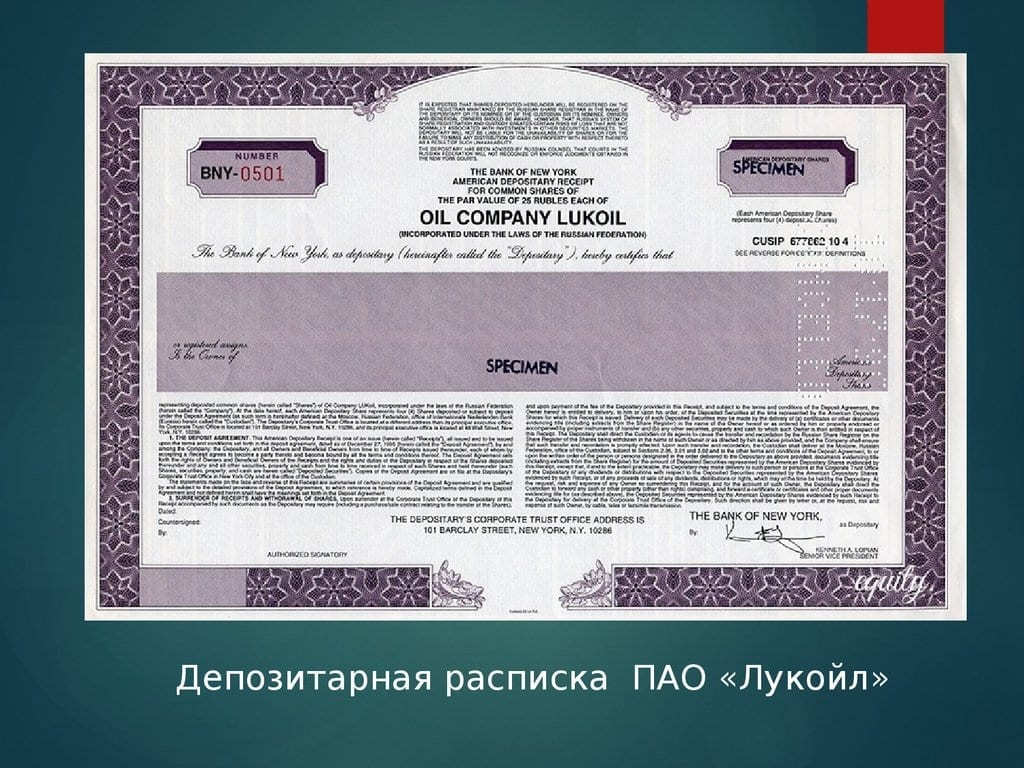
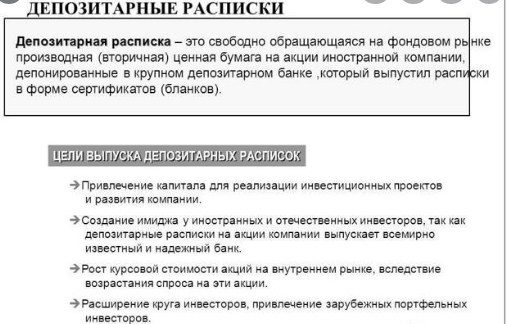
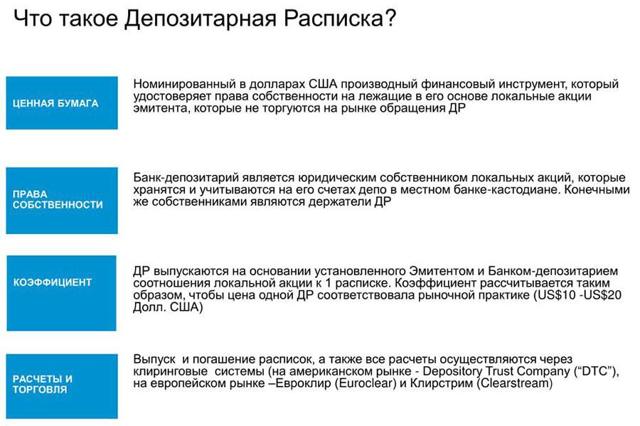
- General information, explanations, mechanism of work
- Difference from stocks
- Who issues a depositary receipt
- Varieties of depositary receipts – ADR EDR GDR RDR
- Pros and cons of using by investors
- Where to find information on depositary receipts on the Moscow Exchange
- Depositary receipts of Russian companies, global
- When to invest in receipts
- How to do it in practice
- Taxation
- Questions and answers
General information, explanations, mechanism of work
In order to start working on a certain exchange, a company must go through the listing procedure. In order for the result to be successful, you must comply with the relevant legal requirements, as well as make an initial investment in order to draw attention to your shares. When choosing which exchange to work on, the company takes into account not only its availability, but also the potential benefit from it. However, the use of depositary receipts makes it possible to make your securities much more popular. As an example, consider a Chinese company. It must agree with its depositary bank to issue depositary receipts for its shares. In this case, the latter will act as a custodian. It can be noted that not only Russian, but also European and American shares are represented on Russian stock exchanges,however, there are very few options for accessing Japanese or Chinese. To start trading depositary receipts, the custodian buys out the required amount of securities and becomes their owner in accordance with the issued documents. Note that in the above example, the purchase was made according to Chinese laws and did not take into account any norms of foreign legislation. that in the above example, the purchase was made according to Chinese laws and at the same time did not take into account any norms of foreign legislation. that in the above example, the purchase was made according to Chinese laws and at the same time did not take into account any norms of foreign legislation.
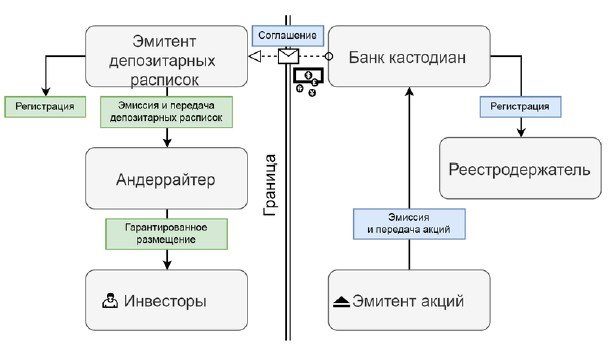
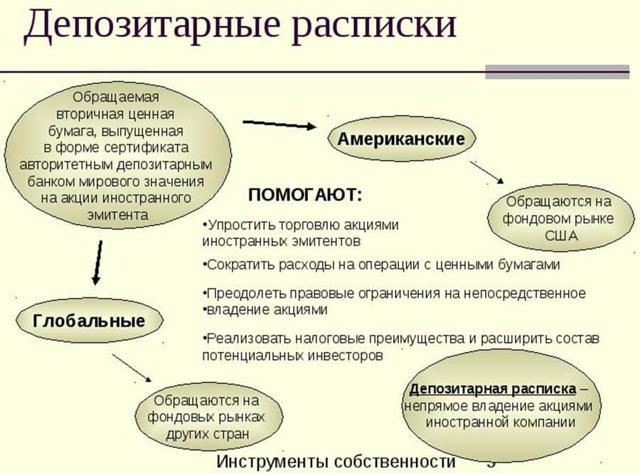
Difference from stocks
Depositary receipts are largely similar to shares, but they have their own distinctive features. They are as follows:
- They are of a secondary nature.
- Provide an opportunity for a trader or investor to trade securities that may not be available to him in any other way.
- In the course of work, there is cooperation between depositary banks located in different countries.
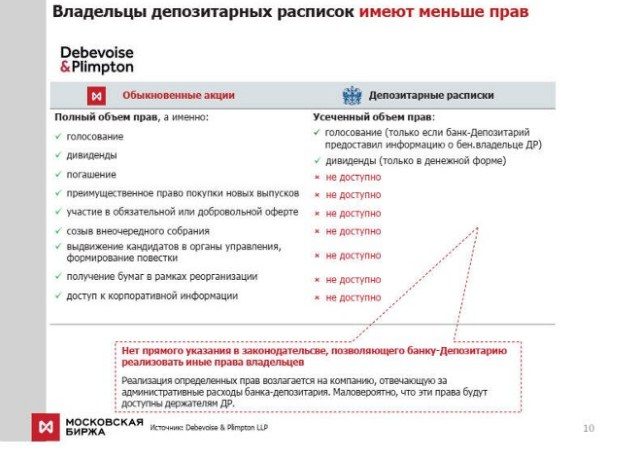
Who issues a depositary receipt
A custodian bank that holds certain securities sells them to a custodian bank in another country. The latter issues depositary receipts for them, which are traded on the exchange. The investor acquires them, acquiring all the necessary rights and actually becomes the owner of the corresponding securities issued in another country. Thus, by using depositary receipts, he expands his capabilities, working with securities that would not otherwise be quoted on his stock exchange.

Varieties of depositary receipts – ADR EDR GDR RDR
The division into types is based on which banks issue them and where they are traded with. Several types of depositary receipts are used:
- ADR (American Depositary Receipt) – receipts issued by American banks. They are designed to work with them on the American stock exchanges and the world’s stock market.
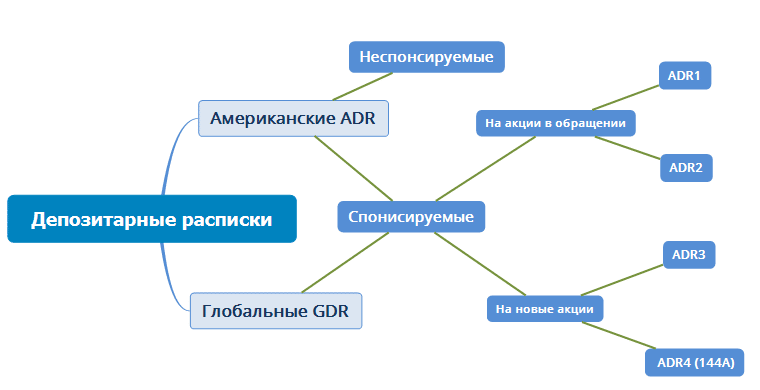
- EDRs are issued by European banks and are traded on European exchanges.
- GDRs are global depositary receipts traded on exchanges in several countries.
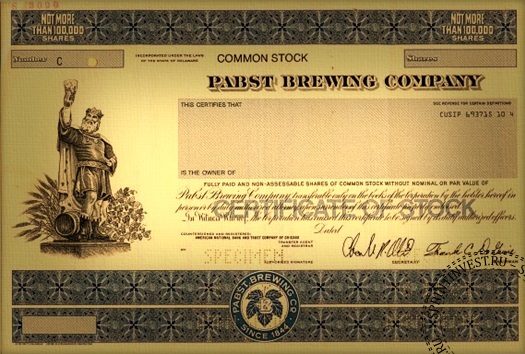
- RF law allows the issuance of RDRs intended for the Russian market, but their use is not common.
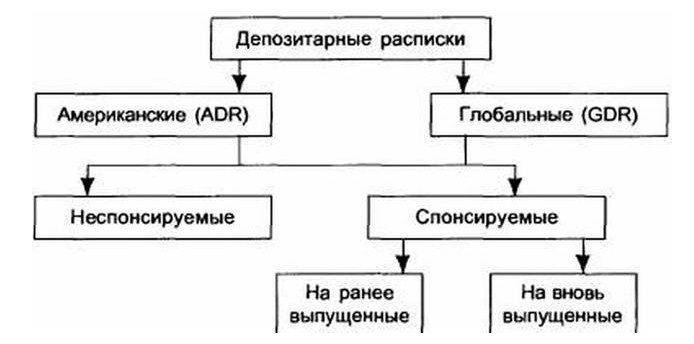
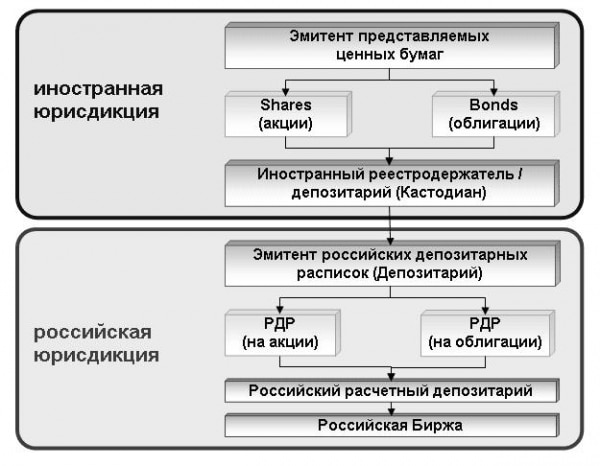
Pros and cons of using by investors
The use of depositary receipts is similar to how you work with stocks and bonds. However, their application provides the participants in transactions with additional opportunities. In doing so, issuers can take advantage of the following benefits:
- Usually he can only offer his shares on certain exchanges. The use of depositary receipts makes them available to others, including overseas.
- By improving accessibility, additional opportunities appear in the search for investors.
- An increase in the supply of shares contributes to the improvement of the company’s reputation.
The investor gets the opportunity to expand the list of instruments with which he can work. This improves the level of asset diversification. With the help of such receipts, one can obtain or expand access to securities from foreign issuers. Working with securities issued abroad, one has to face currency risks. An unpredictable change in the exchange rate can sometimes significantly reduce profitability. The use of depositary receipts solves such problems, since settlements in this case are carried out in the national currency. However, you also need to take into account the presence of certain disadvantages:
- Foreign exchange risks remain when the owner of the shares receives dividends.
- Depositary receipts are less active than stocks and bonds.
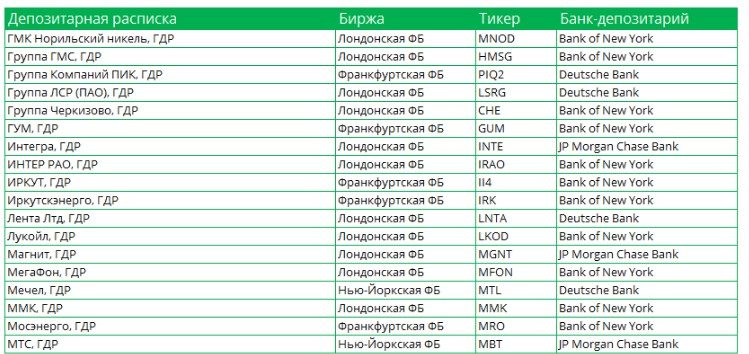
Where to find information on depositary receipts on the Moscow Exchange
If a share and the corresponding depositary receipt are traded on the exchange at the same time, then it is more profitable to trade the primary asset. Most often, however, only one species is represented. In this case, there is no choice between these types of securities. To understand which asset is traded on the exchange, you need to look at the list of instruments. The title will indicate what it is about. The presence of “AO” means that we are talking about shares. If, for example, ADR or GDR is mentioned, then the depositary receipts are traded.
Depositary receipts of Russian companies, global
In Russia, work with depositary receipts is regulated by Law No. 39-FZ “On the Securities Market”. Their definition is given in Art. 2, and the rules of work are formulated in Art. 27.5-3 of this law. List of securities (including depositary receipts) admitted to trading as of 12/22/2021 on MOEX: https://www.moex.com/ru/listing/securities-list.aspx For example, depositary receipts of a foreign issuer for shares (ETLN) on the Moscow Exchange at the link https://www.moex.com/ru/issue.aspx?code=ETLN:
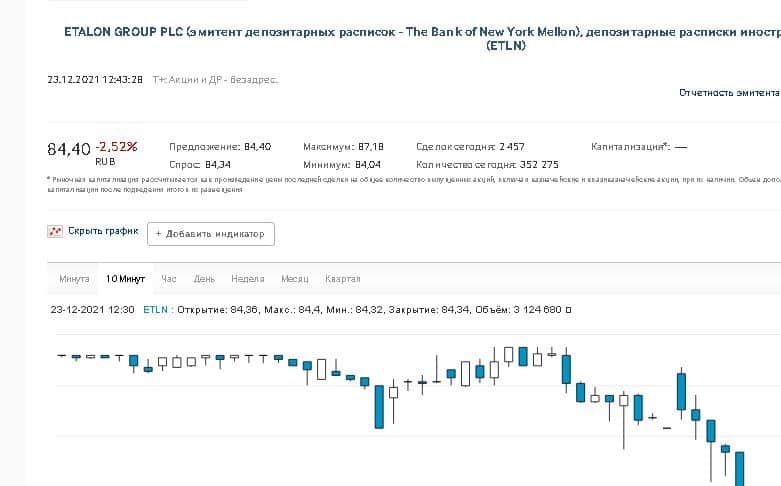
Depositary receipts and international shares on MOEX
When to invest in receipts
In fact, the greatest benefit from depositary receipts exists in those cases when it is possible to get access with their help to exchanges that were previously closed for an investor or trader. For example, we can talk about companies or industries in certain countries that can be considered attractive to work with them. Another benefit of using receipts is that their face value may differ from the corresponding share. Moreover, we can talk not only about 10 or 100 shares, but also about shares. This circumstance makes investment more affordable in cases where the share has a relatively large par value (for example, if it is several thousand dollars).

- When trading or investing, there is significant risk associated with the uncertainty of future price changes. You can reduce it by making portfolio investments. At the same time, purchases of various types of securities are made in accordance with the planned level of risk.
- In order to more accurately assess the options for the future development of the situation, it is necessary to use the methods of fundamental and technical analysis. At the same time, it is important to study the features of the development of the company that issued the receipts and understand how the economic development of its country is taking place.
- If necessary, you need to adjust the composition of the portfolio. This may be necessary in cases where the quotes of certain receipts are developing in an undesirable direction.
- It should be remembered that the use of high yield receipts is often associated with significant risk. Therefore, you cannot invest all available funds in only one type. Diversification reduces risks and increases the chances of making a profit.
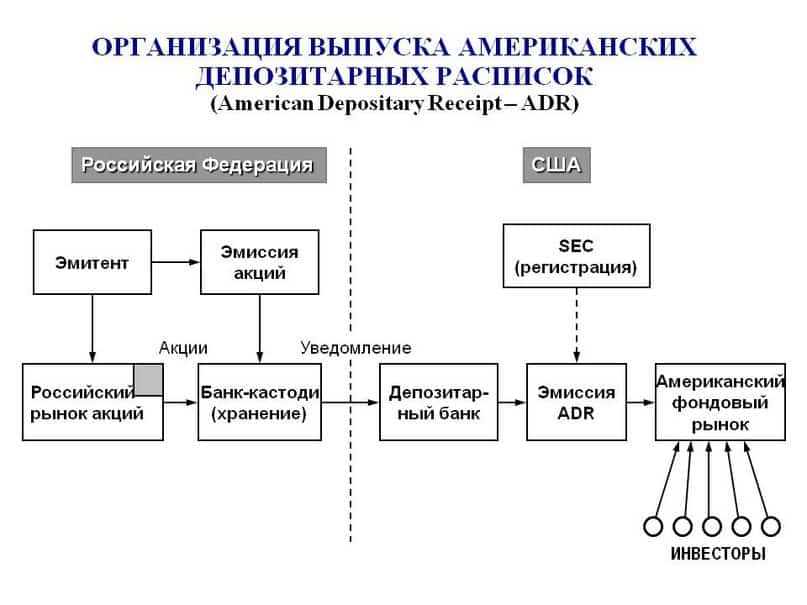
Sometimes it is more profitable to work on the exchange not on your own, but to transfer funds for trust management. In this case, it will be possible to use the services of professionals who, most likely, will be able to provide a suitable return on investment.
Depositary receipts of GDRs, ADRs, RDRs of Russian companies Tinkoff, Mail, Yandex, etc. – taxation, risks, features: https://youtu.be/9p2kxTo9A_U
How to do it in practice
In practical exchange trading, transactions for the purchase and sale of depositary receipts do not differ in their procedure from those that are carried out with shares. By the type and name of the instrument, a trader can select a suitable asset and perform the desired action. Brokers rarely distinguish between these two types of instruments. To clarify whether this is a stock or a depositary receipt, you can look at the reference information on the exchange website.
Taxation
Individual income tax can be paid on the difference between the purchase and sale prices of receipts. The need for payments and the exact calculation of the amount is carried out by the broker. Usually, he himself withdraws the corresponding amount from the account and draws up the payment. When receiving dividends or coupon payments, personal income tax is always paid. It must be displayed in the “3-NDFL” declaration and transferred to the tax office yourself.
Questions and answers
Question: “Which is more reliable: shares or depositary receipts?” Answer: “Their reliability is almost the same. In the latter case, the custodian and the custodian bank are involved in the execution of transactions, but they are almost always reliable and trustworthy organizations. ”
Question: “Which of these assets is more profitable for investing and trading?” Answer: “Working on the stock exchange is associated with the presence of significant risks, which are different in nature. There are no tools here that are guaranteed to make a profit regardless of the circumstances. The use of depositary receipts in its risks is largely similar to the use of the corresponding shares. ”
